
These contaminants often originating from industrial processes, mining activities and agricultural runoff pose significant risks to both ecosystems and human health. Conventional methods for removing heavy metals from wastewater can be costly and sometimes ineffective. In recent years there has been growing interest in the use of algae as a sustainable and efficient solution for wastewater treatment. This article explores the potential of algae in treating wastewater containing heavy metals examining their mechanisms benefits and challenges.
Mechanisms of Algal Treatment
Algae primarily microalgae and macroalgae have shown great potential in absorbing and accumulating heavy metals from wastewater. The mechanisms by which algae achieve this can be broadly categorized into biosorption and bioaccumulation.
Biosorption: Biosorption involves the passive binding of heavy metals to the surface of algal cells. This process is largely driven by the cell wall components such as polysaccharides, proteins and lipids which contain functional groups capable of binding metal ions. The efficiency of biosorption depends on various factors including the type of algae the nature of the heavy metals, pH, temperature and contact time. Algae such as Chlorella vulgaris and Spirulina platensis have demonstrated high biosorption capacities for metals like cadmium, lead and chromium.
Bioaccumulation: Bioaccumulation refers to the active absorption and internalization of toxic substances by algae cells. This process involves the transport of metal ions across the cell membrane and their subsequent sequestration in intracellular compartments.
This story is from the {{IssueName}} edition of {{MagazineName}}.
Start your 7-day Magzter GOLD free trial to access thousands of curated premium stories, and 9,000+ magazines and newspapers.
Already a subscriber ? Sign In
This story is from the {{IssueName}} edition of {{MagazineName}}.
Start your 7-day Magzter GOLD free trial to access thousands of curated premium stories, and 9,000+ magazines and newspapers.
Already a subscriber? Sign In
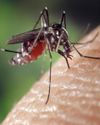
An insight into Chandipura virus in India
Recently lot of news regarding disease due to Chandipura virus has emerged in various newspapers/magazines. After reading the reports published it seems that thing is still brewing in the natures nest and it could affect mankind.

Why elephants never forget?
An elephant has a very large brain for its size and the 'temporal lobe' region responsible for memory is more developed with a greater number of folds - this results in powerful abilities to 'download' important survival data such as where to find food and water, and who is friend or foe.

Use of Algae for Wastewater Treatment Containing Heavy Metals
Wastewater treatment is a critical environmental issue particularly when it comes to the removal of heavy metals.

Nano priming Seeds: A Small Innovation Sparkling Big Advances in Germination
Nanopriming is an emerging agricultural technique where the seeds are treated with nanoparticles to improve their germination, growth, and overall performance.
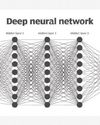
Nobel Laureates in Physics 2024: Revolutionizing AlThe Physics Foundations Behind Machine Learning
This year's two Nobel Laureates in Physics have used tools from physics to develop methods that are the foundation of today's powerful machine learning.
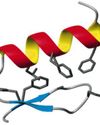
Revolutionizing Biology: The 2024 Nobel Prize in Chemistry Celebrates Breakthroughs in Protein Design and Structure Prediction
The Nobel Prize in Chemistry 2024 is about proteins, life's ingenious chemical tools.
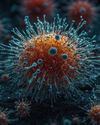
New findings on animal viruses with potential to infect humans
Scientists investigating animal viruses with potential to infect humans have identified a critical protein that could enable spillover of a family of organisms called arteriviruses.

Father-Daughter Team Decodes Mars' Alien Signal
There is no definitive answer to whether aliens exist, but there is a lot of work being done to find out:
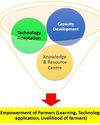
Krishi Vigyan Kendras: Working for Farmer's Welfare
Krishi Vigyan Kendras (Farm Science Centres) are the District level institution serving as an agriculture knowledge resource & capacity development centre which plays indispensable role in front line extension regarding agriculture system in scientific way.

Sixth generation Computer: The future computing technology
We are in a transition towards a digital world, where everything will be dealt with in digital format.